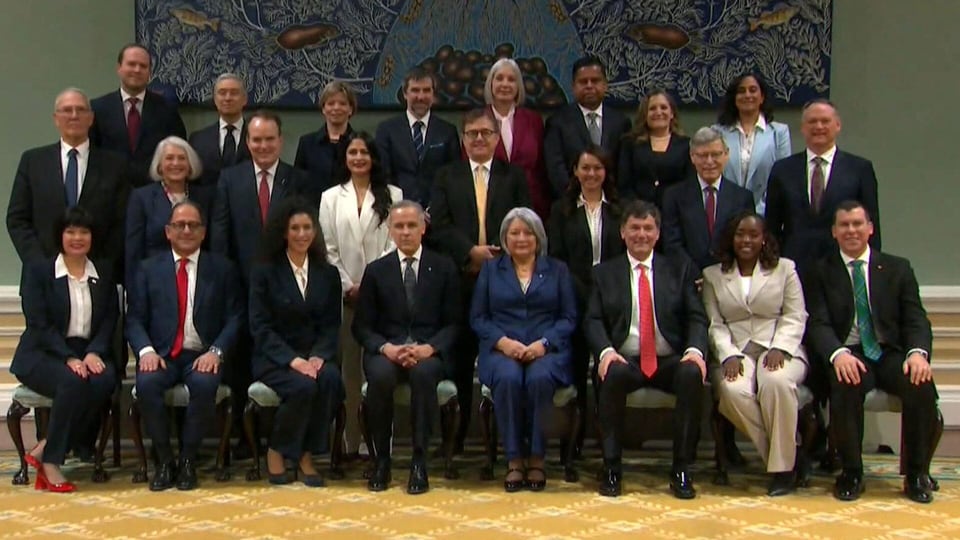Carney's New Cabinet: A Business Perspective

Table of Contents
Economic Policy Shifts and Business Implications
Carney's new cabinet is expected to bring notable changes to both fiscal and monetary policy, directly impacting businesses. Understanding these shifts is crucial for strategic planning and ensuring long-term success. Key areas of focus include tax reform, regulatory changes, and the government's approach to economic growth.
- Changes in tax rates and their effect on profitability: The proposed changes to corporate tax rates, [mention specifics if available, e.g., a reduction or increase], will directly impact business profitability. A reduction could stimulate investment, while an increase might necessitate adjustments to pricing strategies and operational efficiency.
- Predicted impact on interest rates and borrowing costs: The Bank of Canada's monetary policy decisions, influenced by the Finance Minister's priorities, will significantly affect borrowing costs for businesses. Higher interest rates could constrain expansion plans, while lower rates could encourage investment and growth.
- Potential alterations to trade policies and their influence on import/export businesses: The new cabinet's stance on trade agreements, particularly with [mention key trading partners, e.g., the US, EU], will have a direct impact on import/export-oriented businesses. Changes to tariffs or trade deals could lead to opportunities or challenges for businesses operating in the global market.
- Analysis of proposed regulatory changes and their impact on specific industries: New regulations in sectors like energy, technology, and finance will significantly affect industry players. Understanding these regulatory shifts is crucial for compliance and strategic adaptation.
Key Cabinet Appointments and Sectoral Impacts
The appointments to key ministerial positions under Carney's leadership will profoundly shape the direction of various sectors. Analyzing the backgrounds and priorities of these ministers is crucial for anticipating future policy directions.
- Profile of the Finance Minister and their likely approach to economic management: [Name of Finance Minister]’s background and previous statements suggest a [describe their likely approach, e.g., fiscally conservative, expansionary] approach to economic management. This will likely influence the government's spending priorities and fiscal policy decisions.
- Analysis of the Trade Minister's impact on international trade deals and negotiations: [Name of Trade Minister]'s experience in [mention their relevant experience] suggests a focus on [mention their likely trade priorities, e.g., strengthening existing agreements, negotiating new deals]. This will significantly impact the trade relationships between Canada and its key partners.
- Potential changes in the regulatory environment for specific sectors (e.g., energy, technology, agriculture) based on the appointed ministers: The appointment of [Name of Minister] to the [Ministry] suggests potential [describe likely changes, e.g., stricter environmental regulations, increased support for innovation] in the [sector] sector.
The Investment Climate Under Carney's New Cabinet
The investment climate under Carney's new cabinet will be a critical factor determining Canada's economic future. Attracting foreign direct investment (FDI) and stimulating domestic investment are key priorities.
- Assessment of the government's commitment to infrastructure development: The government's plans for infrastructure spending will play a vital role in attracting investment and creating business opportunities. Significant investment in infrastructure could boost investor confidence and stimulate economic growth.
- Analysis of the government's approach to corruption and its impact on investor confidence: A strong commitment to tackling corruption is crucial for attracting both domestic and foreign investment. Transparency and accountability will be key to building investor confidence.
- Discussion of any potential legal or political risks to businesses operating in the country: Potential political instability or changes in legislation could create uncertainty and discourage investment. Businesses need to assess these risks and develop strategies to mitigate potential negative impacts.
Conclusion
Carney's new cabinet presents both opportunities and challenges for businesses in Canada. The potential shifts in economic policy, coupled with the appointments of key ministers, will significantly reshape the business environment. Understanding these changes is paramount for effective strategic planning. The outlook for the Canadian economy under this new cabinet is [describe the overall outlook, e.g., cautiously optimistic, uncertain], contingent on the successful implementation of its economic policies and the ability to foster a stable and attractive investment climate. To succeed in this evolving landscape, businesses should proactively adapt their strategies, closely monitor policy developments, and consider seeking professional advice to navigate the complexities of Carney's new cabinet and its implications for long-term business success.

Featured Posts
-
 Final Game Padres Defeat Cubs To Win Series
May 16, 2025
Final Game Padres Defeat Cubs To Win Series
May 16, 2025 -
 Ukraina Pod Massirovannym Udarom Rossiya Zapustila Svyshe 200 Raket I Dronov
May 16, 2025
Ukraina Pod Massirovannym Udarom Rossiya Zapustila Svyshe 200 Raket I Dronov
May 16, 2025 -
 Colorado Rapids Hand Earthquakes A Defeat Steffens Role In The Loss
May 16, 2025
Colorado Rapids Hand Earthquakes A Defeat Steffens Role In The Loss
May 16, 2025 -
 Suri Cruises Birth Tom Cruises Unexpected Response
May 16, 2025
Suri Cruises Birth Tom Cruises Unexpected Response
May 16, 2025 -
 Posledstviya Masshtabnoy Raketnoy Ataki Rossii Na Ukrainu
May 16, 2025
Posledstviya Masshtabnoy Raketnoy Ataki Rossii Na Ukrainu
May 16, 2025
